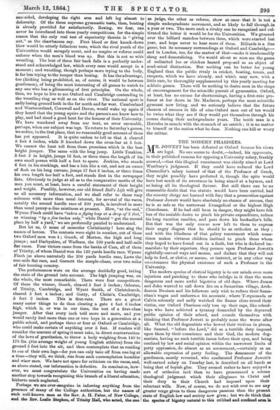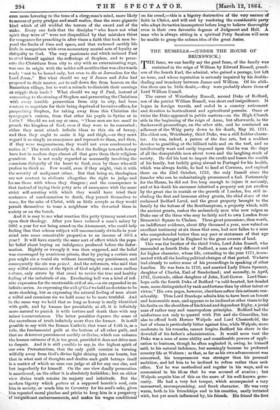THE MODERN PHARISEES.
R. JOWETT has been defeated at Oxford because his views are legal. No one seems to doubt,—indeed, his opponents, in their published reasons for opposing a University salary, frankly avowed,—that this illogical resentment was chiefly aimed at Lord Westbury's judgment. If they could have reduced the Lord Chancellor's salary instead of that of the Professor of Greek, they might possibly have preferred it, though the spite would have lost much of its sweetness in being aimed at a layman, and so losing all its theological flavour. But still there can be no reasonable doubt that the statute would have been carried, had the country clergy not learned with fury that a prosecution against Professor Jowett would have absolutely no chance of success, that he is as safe as the narrowest Evangelical or the highest High Churchman. If he had still been in danger, they might have felt less of the 'amiable desire to pinch his private expenditure, reduce his long vacation rambles, and pare down his bookseller's bills. But that was the only course now left to them to express their angry disgust that he should be as orthodox as they ; and with the blindness of that paltry resentment which some- times makes virtuous children inclined to pinch those whom they hoped to have found out in a fault, but who is declared im- maculate by their superiors, they pounce upon Professor Jowett's rightfully-earned ways and means, and declare that they will not help to feed, or clothe, or amuse, or instruct, or in any other way countenance the physical existence of such a Professor in the University.
The modern species of clerical bigotry is to our minds even more injurious and parching to those who indulge in it than the more dangerous and more awful bigotries of old days. Where James and John wanted to call down fire on a Samaritan village, Arch- deacon Denison and his followers only wish to reduce their Sama- ritan's wages and embarrass his accounts , where Torquemada or Calvin solemnly and sadly watched the flames close round their victim, our Oxford Pharisees only toss up their caps, like school- boys who have achieved a tyranny demanded by the depraved public opinion of their school, and console themselves with thinking that Professor Jowett is probably none the worse after all. What the old dogmatists who hewed their victims in pieces, like Samuel, " before the Lord," did as a terrible duty imposed upon them by their conscience and their God, the modern dog- matists, having no such terrible issues before their eyes, and being confined by law and social opinion within the narrowest limits of petty oppression, do almost as an amusement,—certainly as an allowable expression of party feeling. The demeanour of the gentlemen, mostly reverend, who confiscated Professor Jowett's well-earned salary on Tuesday last, is described on all hands as being that of boyish glee. They seemed rather to have enjoyed a sort of orthodox lark than to have pronounced a solemn theological judgment which their allegiance to Christ and their duty to their Church had imposed upon their reluctant wills. Now, of course, we do not wish ever to see any greater verge given to these dangerous passions than the present state of English law and society now eves ; bat we do think that the species of bigotry natural to this cribbed and confined area is even more lowering to the tone of a clergyman's mind, more likely to savour of petty grudges and small malice, than the more gigantic
kind which of old wielded the terrors of the sword and of the stake. Every one feels that the disciples " who knew not what spirit they were of " were not disqualified by that mistaken thirst for vengeance for preaching in after times a faith that took men be- yond the limits of time and space, and that reckoned earthly life little in comparison with even momentary mental acts of loyalty or disloyalty to God. The very passionate zeal which induced Paul to steel himself against the sufferings of Stephen, and to perse- cute the Christians from city to city with an exterminating rage, was one in origin with the nobler self-sacrifice that was afterwards ready " not to be bound only, but even to die at Jerusalem for the Lord Jesus." But what should we say if James and John had
proposed to their master, not to call down fire from heaven on the Samaritan village, but to work a miracle to diminish their earnings or cripple their trade ? What should we say if Paul, instead of consenting to the stoning of Stephen and persecuting the Christians with every terrible persecution from city to city, had been content to negotiate for their being deprived of lucrative offices, for pauperizing Stephen, for taking away from this Christian the synagogue's custom, from that other his pupils in Syriac or in Latin ? Should we not say at once, " Those men are too small to preach the kingdom of God, even if they were to be converted ; either they must attach infinite ideas to this sin of heresy, and then they ought to smite it hip and thigh,—or they must regard it as simply an annoyance and reproach to them, and then, if they were magnanimous, they would not even condescend to notice it." The truth evidently is, that the feelings towards heresy have lost in modern days almost all that gave them their religious grandeur. It is not really regarded as necessarily involving the conscious disloyalty of the heart to God, even by those who still profess to think so. Few would, even if they might, visit it with the severity of malignant crime. But that being so, theologians are not content to abdicate altogether the right to judge and ha:ass those with whom they disagree ; and the consequence is that instead of trying their petty acts of annoyance with the same strict self-scrutiny with which they would have tried their sentences of condemnation to death, they permit themselves to tease, for the sake of Christ, with as little scruple as they would permit themselves to tease a neighbour who thwarted them in society or on the bench.
And it is easy to see what reaction this petty tyranny must exert upon their theology. After you have reduced a man's salary by 3601. a year for not being sound on the Atonement, who could help feeling that that solemn subject will unconsciously dwindle in your mind into some conceivable proportion to an income of 3601. a year? It will have exactly the same sort of effect which the popu- lar belief about buying an indulgence produced before the Refor- mation. Rightly or wrongly it was then supposed, and the belief was encouraged by avaricious priests, that by paying a certain sum you might sin a venial sin without incurring any punishment, and consequently the sin was priced. And the reformers, who said that any wilful resistance of the Spirit of God might cost a man endless torture, only strove by that creed to revive the true and healthy feeling of the infinitude of sin. Everlasting hell was a kind of infi- nite expression for the unutterable evil of sin,—a sin expanded in an infinite series. As expressing the will of God we hold no doctrine to be more shocking, but as expressing the natural feeling of man about a wilful and conscious sin we hold none to be more truthful. And in the same way we hold that so long as heresy is really identified with guilt, and by human law punishable at all, it is infinitely more natural to punish it with torture and death than with any minor inconveniences. The latter penalties deprave the sense of the sacredness of truth infinitely more than the former. It is still possible to say with the Roman Catholic that want of faith is, as a rule, the fundamental guilt at the bottom of all other guilt, and that no deterrent punishment earthly or divine, which can enhance the human estimate of it, is too great, provided it does not drive men to despair. And it is still possible to say, in the highest spirit of our own Protestantism, that the only guilt consists in turning wilfully away from God's divine light shining into our hearts, but that in what sort of thoughts and doubts such guilt betrays itself is a matter of which no man can judge at all for any one else, and but imperfectly for himself. On the one view deadly persecution is sanctioned, on the other it is absolutely forbidden ; but on either view divine truth retains its majesty and infinitude. But the modern bigotry which potters at a supposed heretic's soul, cuts him in society, or sends him to Coventry for his soul's sake, gives him repeated moral pinches and pricks to keep him in a purgatory of insignificant embarrassments, and makes his wages conditional on his creed,—this is a bigotry destructive of the very essence of faith in Christ, and will end by rendering the considerable party who adopt its tactics incompetent before long to believe thoroughly even in their own favourite dogmas of Judgment and Hell. A man who is always sitting in a spiritual Petty Sessions will soon be unable to grasp the solemn idea of the great Assize.



































 Previous page
Previous page